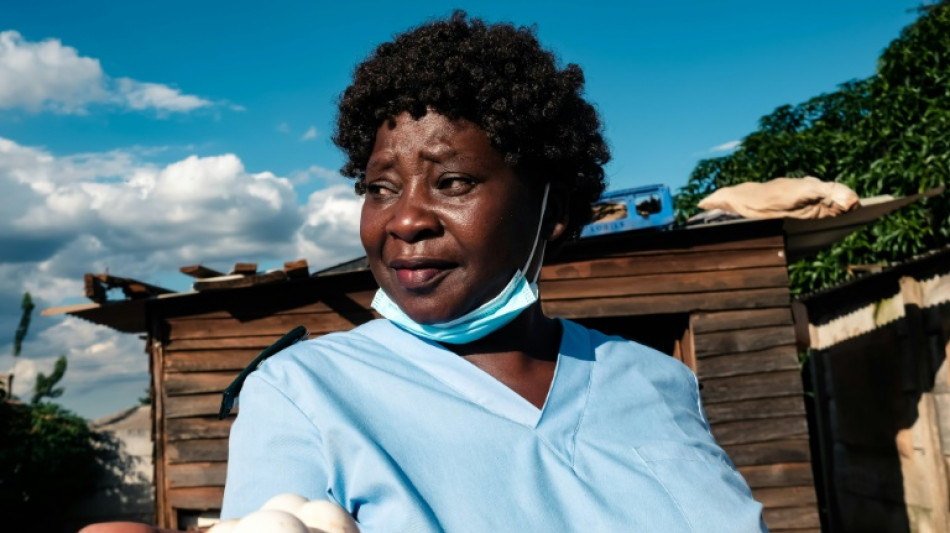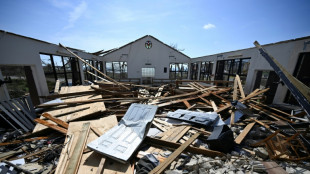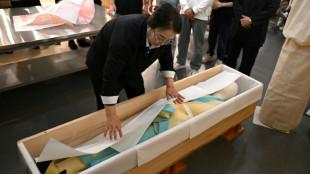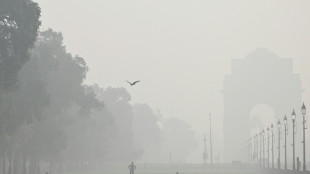
-
 Milan deny Roma top spot in Serie A, Inter beat Verona
Milan deny Roma top spot in Serie A, Inter beat Verona
-
Lens back up to third in Ligue 1 as Lyon held at Brest

-
 NFL-best Colts fall to Steelers, Packers lose to Carolina
NFL-best Colts fall to Steelers, Packers lose to Carolina
-
'Regretting You' wins spooky slow N. American box office

-
 'Just the beginning' as India lift first Women's World Cup
'Just the beginning' as India lift first Women's World Cup
-
Will Still sacked by struggling Southampton

-
 Malinin wins Skate Canada crown with stunning free skate
Malinin wins Skate Canada crown with stunning free skate
-
Barca beat Elche to recover from Clasico loss

-
 Jamaica deaths at 28 as Caribbean reels from colossal hurricane
Jamaica deaths at 28 as Caribbean reels from colossal hurricane
-
Verma and Sharma power India to first Women's World Cup triumph

-
 Auger-Aliassime out of Metz Open despite not yet securing ATP Finals spot
Auger-Aliassime out of Metz Open despite not yet securing ATP Finals spot
-
Haaland fires Man City up to second in Premier League

-
 Sinner says staying world number one 'not only in my hands'
Sinner says staying world number one 'not only in my hands'
-
Ready for it? Swifties swarm German museum to see Ophelia painting

-
 Pope denounces violence in Sudan, renews call for ceasefire
Pope denounces violence in Sudan, renews call for ceasefire
-
Kipruto, Obiri seal Kenyan double at New York Marathon

-
 OPEC+ further hikes oil output
OPEC+ further hikes oil output
-
Sinner returns to world number one with Paris Masters win

-
 Sinner wins Paris Masters, reclaims world No. 1 ranking
Sinner wins Paris Masters, reclaims world No. 1 ranking
-
Nuno celebrates first win as West Ham boss

-
 Obiri powers to New York Marathon win
Obiri powers to New York Marathon win
-
Two Louvre heist suspects a couple with children: prosecutor

-
 Verma, Sharma help India post 298-7 in Women's World Cup final
Verma, Sharma help India post 298-7 in Women's World Cup final
-
Inter snapping at Napoli's heels, Roma poised to pounce

-
 India space agency launches its heaviest satellite
India space agency launches its heaviest satellite
-
Wolves sack Pereira after winless Premier League start

-
 Debutants Berkane among CAF Champions League top seeds
Debutants Berkane among CAF Champions League top seeds
-
Sundar steers India to five-wicket win over Australia in 3rd T20

-
 What we know about the UK train stabbings
What we know about the UK train stabbings
-
Jonathan Milan wins wet Tour de France Singapore Criterium

-
 Canadian teen Mboko wins Hong Kong Open for second WTA title
Canadian teen Mboko wins Hong Kong Open for second WTA title
-
Two children among dead in Russian blitz on Ukraine

-
 South Africa opt to bowl against India in Women's World Cup final
South Africa opt to bowl against India in Women's World Cup final
-
Dominant McKibbin wins Hong Kong Open to seal Masters spot

-
 US Navy veterans battle PTSD with psychedelics
US Navy veterans battle PTSD with psychedelics
-
'Unheard of': Dodgers in awe of iron man Yamamoto

-
 UK police probe mass train stabbing that wounded 10
UK police probe mass train stabbing that wounded 10
-
'It's hard' - Jays manager Schneider rues missed chances in World Series defeat

-
 Women's cricket set for new champion as India, South Africa clash
Women's cricket set for new champion as India, South Africa clash
-
Messi scores but Miami lose as Nashville level MLS Cup playoff series

-
 Dodgers clinch back-to-back World Series as Blue Jays downed in thriller
Dodgers clinch back-to-back World Series as Blue Jays downed in thriller
-
Vietnam flood death toll rises to 35: disaster agency

-
 History-making Japan golf twins push each other to greater heights
History-making Japan golf twins push each other to greater heights
-
Death becomes a growing business in ageing, lonely South Korea

-
 India's cloud seeding trials 'costly spectacle'
India's cloud seeding trials 'costly spectacle'
-
Chiba wins women's title, Malinin leads at Skate Canada

-
 Siakam sparks injury-hit Pacers to season's first NBA win
Siakam sparks injury-hit Pacers to season's first NBA win
-
Denmark's fabled restaurant noma sells products to amateur cooks

-
 UK train stabbing wounds 10, two suspects arrested
UK train stabbing wounds 10, two suspects arrested
-
Nashville top Messi's Miami 2-1 to level MLS Cup playoff series


Zimbabwe healthcare bleeds amid mass nurse exodus
Virginia Mutsamwira says she treats four times the number of patients she should ideally handle at a township clinic in Harare, the capital of Zimbabwe.
"It's tiring -- the nurse-patient ratio is really bad," she says, throwing herself onto a brown sofa at her house in Cold Comfort township after a 12-hour shift.
"It's frustrating, because you can't offer quality care."
The 52-year-old senior nurse is skilled, experienced and educated. Yet her monthly salary of some $200 (192 euros) barely covers her basics.
To make ends meet for her family of eight, she runs a small grocery shop out of her home, where she also rears chickens and rabbits for sale.
After work, before she even takes off her blue uniform, she feeds the chickens.
She is joining the exodus of healthcare workers emigrating from Zimbabwe -- in her case, "to secure my retirement."
Official figures show that last year alone Zimbabwe lost nearly 1,800 nurses, mainly to Britain. That's more than 10 percent of all the nurses working in public hospitals.
Mutsamwira has already done her International English Language Test, required to get a visa to the United Kingdom, where salaries are around 10 times higher than in Zimbabwe.
The outflow of nursing staff is stripping the country of desperately-needed skills.
"We are always overwhelmed because many nurses are leaving," says Josephine Marare, 33, who works at one of the country's largest public hospitals, Sally Mugabe Central Hospital.
Under-equipped facilities only worsen morale. "Imagine working in a hospital where there are no bandages, no water, no basic drugs like painkillers," she says.
"I am just so frustrated. If I get money to get a visa, I will join the others who are leaving."
The migration has spurred demand for passports, with people queueing up before dawn to apply for travel documents in Harare.
- 'Won a lottery' -
Zimbabwe's healthcare facilities have been crumbling for more than a decade, tracking the downward spiral of the economy.
"The main driving factor is poor remuneration," said Simbarashe Tafirenyika, president of the Zimbabwe Urban and Rural Council Nurses Workers Union, explaining the nurses' exodus.
"They need to pay school fees, put food on the table. If anyone gets an opportunity, they are going."
It's so desperate that many highly qualified nurses opt for junior roles abroad because these pay better.
The Health Service Board, which grades and appoints government health workers, admits the mass exodus of nurses has had an effect.
Under a programme aimed at filling staffing gaps, retired nurses are being re-hired while training is being expanded.
"Losing experienced workers is always a challenge," spokesman Livingstone Mashange said.
The board's website opens with a picture of smiling nurses leaping joyfully and a bold "we are hiring" message.
Like other rich countries, Britain has a long tradition of recruiting staff from developing countries to meet the needs of its health service.
But shortages in the UK have shot up, driven by the Covid-19 pandemic and a dramatic drop in nurses recruited from eastern Europe as a result of Brexit.
According a report last June by the Health Foundation think-tank, Britain's National Health Service (NHS) faced a shortfall of 93,000 staff. Some 42 percent of them were nurses.
Jason Mutambara, a 45-year-old Zimbabwean father of four, migrated to Britain last year.
He says he has no regrets -- his monthly income rocketed to £2,700 ($3,375), enabling him to easily afford his children's school fees.
"It was like you've just won a lottery," he said. "You can't even think of coming back at the moment."
Mutambara's hope is that the Zimbabwean authorities fix the health system to stop the haemorrhage of skills.
"We were trained in Zimbabwe and we owe it to the people of Zimbabwe to continue working for them," he said. But for now, it appears Britain will be hiring for years to come.
M.Furrer--BTB




